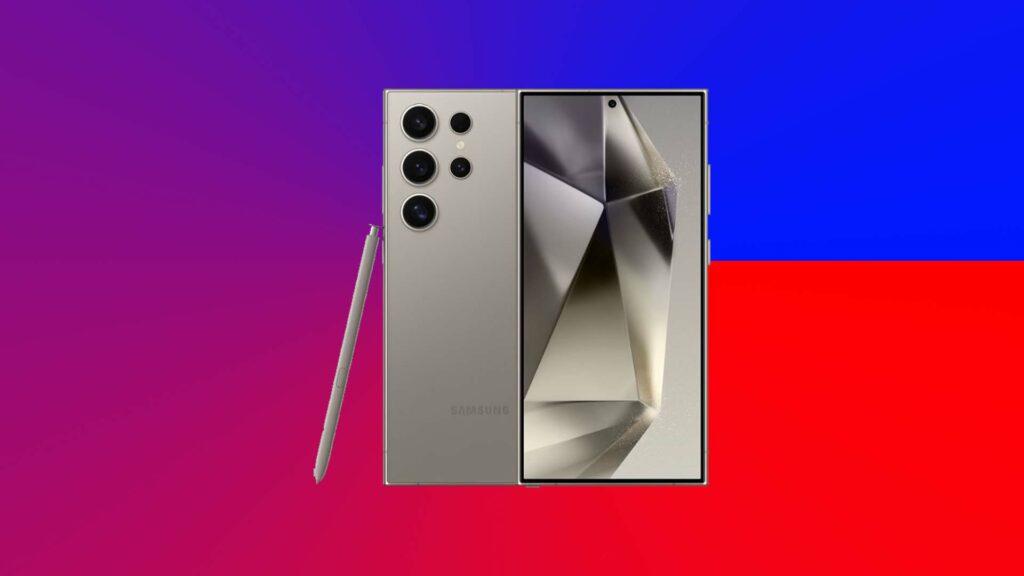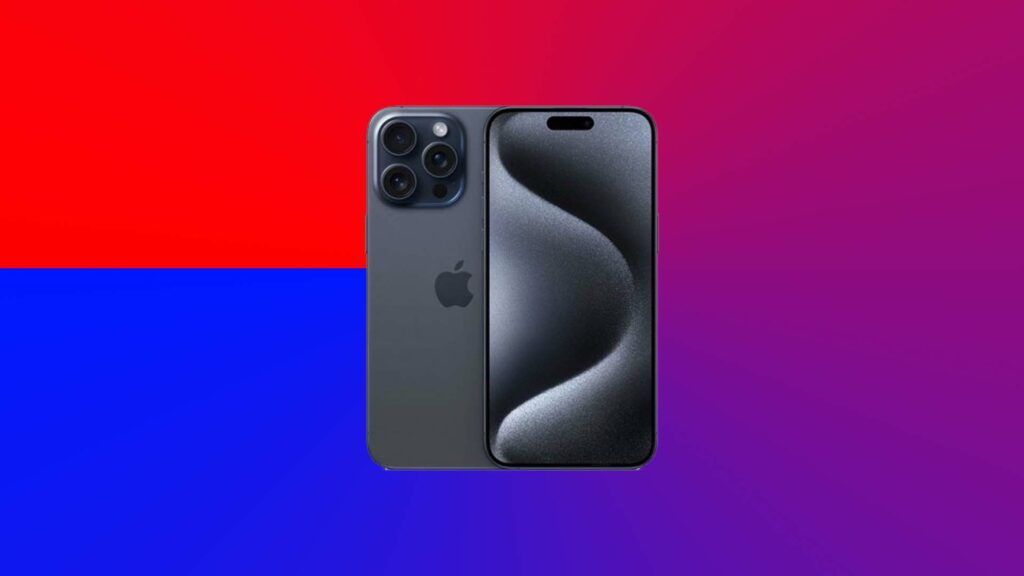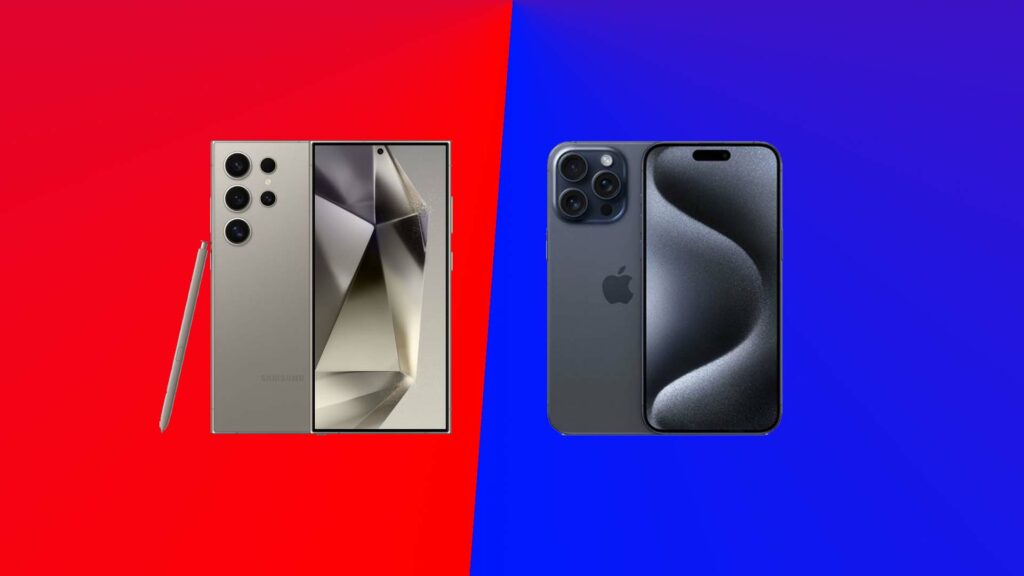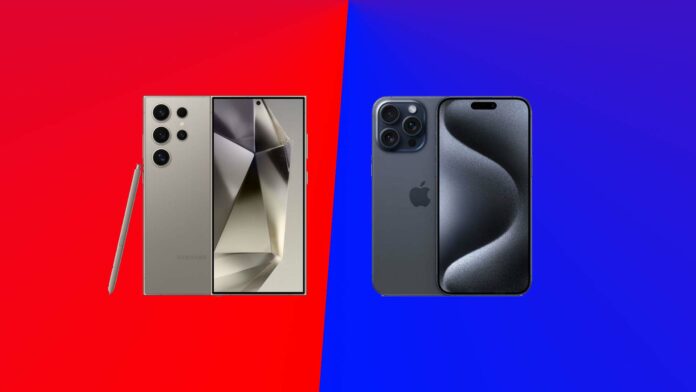Comparison, Samsung Galaxy S24 Ultra vs iPhone 15 Pro Max.
Samsung Galaxy S24 Ultra
- Weight: 232g
- Dimensions: 162.3 x 79 x 8.6mm
- Screen size: 6.8-inch
- Resolution: 1440 x 3120
- Chipset: Snapdragon 8 Gen 3
- RAM: 12GB
- Storage: 256GB/512GB/1TB
- Battery: 5,000mAh
- Rear camera: 200MP+50MP+12MP+10MP
- Front camera: 12MP
The Samsung Galaxy S24 Ultra presents stiff competition for the iPhone 15 Pro Max. It boasts more cameras, RAM, a larger battery, and a brighter screen. However, quantity doesn’t always mean superiority.

Pros:
- Exceptional cameras
- Titanium frame
- High performance
Cons:
- AI functionality lacks utility
- Bulky and heavy
- User interface shortcomings
iPhone 15 Pro Max
- Weight: 221g
- Dimensions: 159.9 x 76.7 x 8.3mm
- Screen size: 6.7-inch
- Resolution: 1290 x 2796
- Chipset: A17 Pro
- RAM: 8GB
- Storage: 256GB/512GB/1TB
- Battery: 4,441mAh
- Rear camera: 48MP+12MP+12MP
- Front camera: 12MP
The iPhone 15 Pro Max falls just short of the Samsung Galaxy S24 Ultra in many aspects. Yet, it offers close competition, with sleeker software and the advantage of Dynamic Island integration.

Pros:
- Stunning design
- Superb photography
- Cutting-edge performance
Cons:
- Fewer camera options
- Smaller battery capacity
- Dimmer display
Apple’s top-tier offering, the iPhone 15 Pro Max, stands as one of the finest smartphones available. However, it faces formidable competition with the arrival of Samsung’s Galaxy S24 lineup, particularly the Samsung Galaxy S24 Ultra.
With more cameras and a larger display compared to the iPhone 15 Pro Max, the Samsung Galaxy S24 Ultra also shares similarities such as a titanium frame.
To aid your decision-making process between these two flagship devices, let’s compare their specifications and our findings from the iPhone 15 Pro Max review and the Samsung Galaxy S24 Ultra review.
If you’re uncertain about opting for the Ultra model, be sure to explore our Samsung Galaxy S24 review and our hands-on Samsung Galaxy S24 Plus review.
Samsung Galaxy S24 Ultra vs iPhone 15 Pro Max: Specs Comparison
Here’s a quick look at the key specifications of both the Samsung Galaxy S24 Ultra and the iPhone 15 Pro Max:
Samsung Galaxy S24 Ultra | iPhone 15 Pro Max
- Dimensions: 162.3 x 79 x 8.6mm | 159.9 x 76.7 x 8.3mm
- Weight: 232g | 221g
- Display: 6.8-inch AMOLED | 6.7-inch OLED
- Resolution: 1440 x 3120 | 1290 x 2796
- Refresh rate: 1Hz-120Hz (dynamic) | 1Hz-120Hz (dynamic)
- Chipset: Qualcomm Snapdragon 8 Gen 3 | Apple A17 Pro
- Rear cameras: 200MP main, 12MP ultra-wide, 10MP telephoto (3x zoom), 50MP periscope (5x zoom) | 48MP main, 12MP ultra-wide, 12MP periscope (5x zoom)
- Front camera: 12MP | 12MP
- RAM: 12GB | 8GB
- Storage: 256GB / 512GB / 1TB | 256GB / 512GB / 1TB
- Battery: 5,000mAh | 4,441mAh
- Charging: 45W wired, 15W wireless, 4.5W reverse wireless | 20W wired, 15W wireless
- Colors: Titanium Violet, Titanium Gray, Titanium Black, Titanium Yellow, Titanium Blue, Titanium Green, Titanium Orange | Black Titanium, White Titanium, Blue Titanium, Natural Titanium
Samsung Galaxy S24 Ultra vs iPhone 15 Pro Max: Price and Availability
The iPhone 15 Pro Max hit the shelves in September 2023, offering global availability. It kicks off at $1,199 / £1,199 / AU$2,199 for the 256GB variant. For 512GB, you’ll shell out $1,399.99 / £1,399 / AU$2,549, or opt for 1TB at $1,599.99 / £1,599 / AU$2,899, with 8GB RAM across the board.
Samsung’s Galaxy S24 Ultra, unveiled on January 17 and released on January 31, is now ripe for deals. The starting price for the Galaxy S24 Ultra is $1,299 / £1,249 / AU$2,199, coming with 256GB storage.
For higher capacity, expect to pay $1,419.99 / £1,349 / AU$2,399 for 512GB, or $1,659.99 / £1,549 / AU$2,799 for 1TB, all bundled with 12GB RAM.
While the Samsung Galaxy S24 Ultra begins at $100 / £50 above the iPhone 15 Pro Max, it’s priced equally in Australia. At the pinnacle, the Galaxy S24 Ultra demands $60 more but £50 / AU$100 less. In essence, prices are quite similar, but they may vary slightly depending on region and chosen configuration.
Samsung Galaxy S24 Ultra vs iPhone 15 Pro Max: Design and Display
The iPhone 15 Pro Max boasts a glass back, titanium frame, and a flat screen with a sizable Dynamic Island cut. Its rear houses a large, square triple-lens camera block.
Similarly, the Samsung Galaxy S24 Ultra features a titanium frame, a premium choice over aluminum or stainless steel. It also sports a glass back, but with individual camera lenses protruding rather than a block, and less curvy corners.
The Samsung Galaxy S24 Ultra’s display has a tiny punch-hole cut-out compared to the iPhone’s Dynamic Island. It lacks the iPhone’s Action button but includes an S Pen stylus with a designated slot, absent in Apple’s device.
Both phones share an IP68 rating for water and dust resistance.
In terms of size, the Samsung Galaxy S24 Ultra measures 162.3 x 79 x 8.6mm, slightly larger and thicker than the iPhone 15 Pro Max at 159.9 x 76.7 x 8.3mm. It also weighs more at 232g, compared to the iPhone’s 221g.
Color options vary, with the iPhone offering Black Titanium, White Titanium, Blue Titanium, and Natural Titanium, while the Samsung Galaxy S24 Ultra provides Titanium Violet, Titanium Gray, Titanium Black, Titanium Yellow, Titanium Blue, Titanium Green, and Titanium Orange.
Regarding displays, the iPhone 15 Pro Max features a 6.7-inch 1290 x 2796 OLED with a 120Hz refresh rate and 2,000 nits peak brightness. In contrast, the Samsung Galaxy S24 Ultra boasts a 6.8-inch 1440 x 3120 AMOLED display, slightly larger and brighter at 2,600 nits peak brightness, with similar refresh rate capabilities.
Samsung Galaxy S24 Ultra vs iPhone 15 Pro Max: Cameras
The iPhone 15 Pro Max boasts a formidable camera setup, including a 48MP f/1.8 main camera, a 12MP f/2.2 ultra-wide with a 120-degree field of view, a 12MP f/2.8 periscope camera with 5x optical zoom, and a 12MP f/1.9 front-facing camera.
In contrast, the Samsung Galaxy S24 Ultra’s camera array features a 200MP f/1.7 main camera, a 12MP f/2.2 ultra-wide with a 120-degree field of view, a 10MP f/2.4 telephoto with 3x optical zoom, a 50MP f/3.4 periscope camera with 5x optical zoom, and a 12MP f/2.2 front-facing camera.
While both phones offer 12MP selfie cameras and 5x optical zoom on the rear, the Samsung Galaxy S24 Ultra extends its capabilities with 3x optical zoom and higher megapixels in its main and periscope cameras.
Arguably, the Samsung Galaxy S24 Ultra edges ahead in camera performance, lauded for its reliability and versatility in various conditions, as highlighted in our Samsung Galaxy S24 Ultra review.
Furthermore, the Galaxy S24 Ultra stands out with its AI camera features, enabling tasks like adjusting people’s positions in photos and extending backgrounds. However, the effectiveness of these AI capabilities can vary, occasionally rendering them less useful.

Samsung Galaxy S24 Ultra vs iPhone 15 Pro Max: Performance
In terms of sheer performance, the iPhone 15 Pro Max holds a significant advantage with its A17 Pro chipset, surpassing Android phones in benchmarks. However, it’s equipped with 8GB of RAM, which may seem modest for a flagship device, yet Apple optimizes memory usage efficiently.
On the other hand, the Samsung Galaxy S24 Ultra boasts a Snapdragon 8 Gen 3 for Galaxy chipset, an overclocked version of the standard Snapdragon 8 Gen 3, widely regarded as one of the best for Android devices. Paired with 12GB of RAM, the Galaxy S24 Ultra delivers formidable performance.
Both phones excel in performance. While the iPhone 15 Pro Max offers “fantastic performance,” enabling console gaming, the Galaxy S24 Ultra potentially outpaces it, as noted in our review, where we found it to be as fast or even faster in many aspects.
Storage options range from 256GB to 1TB for both the iPhone 15 Pro Max and the Samsung Galaxy S24 Ultra.
In terms of software, the iPhone 15 Pro Max operates on iOS 17, while the Samsung Galaxy S24 Ultra runs Android 14 with Samsung’s One UI overlay.
While both operating systems are capable, personal preference often dictates choice. However, if AI integration is a priority, the Samsung Galaxy S24 Ultra offers an advantage.
Nonetheless, Samsung’s One UI overlay has faced criticism for being increasingly cluttered and cumbersome to navigate, with essential features buried deep within menus. For a smoother software experience, the iPhone is the preferred option.
Samsung Galaxy S24 Ultra vs iPhone 15 Pro Max: Battery Life
The iPhone 15 Pro Max is equipped with a 4,441mAh battery, supporting up to 27W wired charging and 15W wireless charging. In contrast, the Samsung Galaxy S24 Ultra boasts a larger 5,000mAh battery, offering 45W wired charging, 15W wireless charging, and Wireless Power Share for wirelessly charging other devices.
With faster charging and a slightly larger battery, the Galaxy S24 Ultra seems to have the upper hand. However, efficiency plays a crucial role.
In testing, the Galaxy S24 Ultra lasted 16 hours and 45 minutes when continuously browsing on 5G, outlasting the iPhone 15 Pro Max, which managed 14 hours and 2 minutes.
Apple claims up to 29 hours of video playback or up to 95 hours of audio playback for the iPhone 15 Pro Max. Samsung’s stats for the Galaxy S24 Ultra include up to 28 hours of internet usage, up to 30 hours of video playback, or up to 95 hours of audio playback.
While battery life differences aren’t significant, the Samsung Galaxy S24 Ultra does have a slight advantage.
Samsung Galaxy S24 Ultra vs iPhone 15 Pro Max: Verdict
The Samsung Galaxy S24 Ultra shines with a brighter screen, an additional camera, higher camera megapixels, enhanced AI capabilities, more RAM, a larger battery, and faster charging.
Conversely, the iPhone 15 Pro Max boasts smoother, more intuitive software, complemented by a Dynamic Island feature. Priced similarly, both phones share commonalities like a titanium frame.
Ultimately, the pivotal difference lies in the operating system: iOS for Apple and Android for Samsung.
Given the strong user loyalty to either iOS or Android, this could sway the decision for many. However, for undecided buyers, choosing between the Samsung Galaxy S24 Ultra and the iPhone 15 Pro Max presents a challenging dilemma, as both stand as top contenders in the smartphone market.
